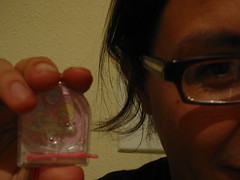Nothingness encapsulated. You won't feel a thing.
Sunday, November 20, 2005
I don't know who said that novelists read the novels of others only to figure out how they are written. I believe it's true. We aren't satisfied with the secrets exposed on the surface of the page: we turn the book around to find the seams. In a way that's impossible to explain, we break the book down to its essential parts and then put it back together after we understand the mysteries of its personal clockwork. The effort is disheartening in Faulkner's books, because he doesn't seem to have an organic system of writing, but instead walks blindly through his biblical universe, like a herd of goats loosed in a shop full of crystal. Managing to dismantle a page of his, one has the impression of springs and screws left over, that it's impossible to put back together in its original state. Hemingway, by contrast, with less inspiration, with less passion and less craziness but with a splendid severity, left the screws fully exposed, as they are on freight cars. Maybe for that reason Faulkner is a writer who has had much to do with my soul, but Hemingway is the one who had the most to do with my craft - not simply for his books, but for his astounding knowledge of the aspect of craftsmanship in the science of writing. In his historic interview with George Plimpton in The Paris Review, (Hemingway) showed for all time - contrary to the Romantic notion of creativity -that economic comfort and good health are conducive to writing; that one of the chief difficulties is arranging the words well; that when writing becomes hard it is good to reread one's own books, in order to remember that it always was hard; that one can write anywhere so long as there are no visitors and no telephone; and that it is not true that journalism finishes off a writer, as has so often been said - rather, just the opposite, so long as one leaves it behind soon enough. ''Once writing has become the principal vice and the greatest pleasure,'' he said, ''only death can put an end to it.'' Finally, his lesson was the discovery that each day's work should only be interrupted when one knows where to begin again the next day. I don't think that any more useful advice has ever been given about writing. It is, no more and no less, the absolute remedy for the most terrible specter of writers: the morning agony of facing the blank page. (GGM hablando de Hemingway)
Subscribe to:
Post Comments (Atom)
Blog Archive
- August (2)
- July (3)
- April (1)
- March (2)
- February (1)
- November (4)
- October (1)
- September (2)
- June (1)
- May (3)
- April (4)
- January (1)
- November (8)
- October (2)
- September (1)
- July (3)
- June (2)
- May (4)
- March (2)
- February (8)
- December (2)
- November (3)
- October (5)
- September (9)
- July (2)
- June (2)
- May (1)
- April (1)

No comments:
Post a Comment